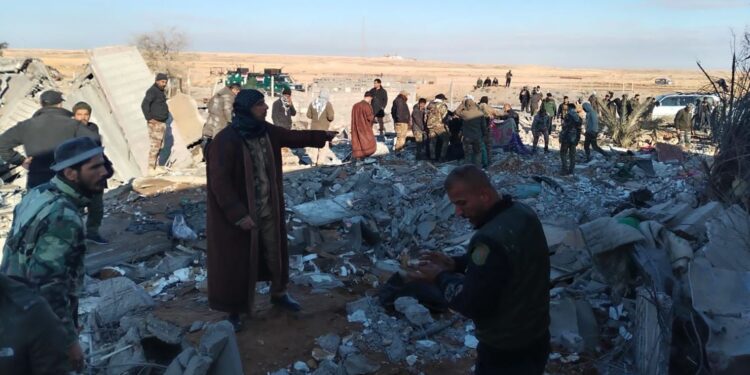The United States’ recent wave of airstrikes on Iran-aligned targets in Iraq and Syria has sparked widespread reactions from around the world. The military action, launched in retaliation for an attack that claimed American soldiers’ lives in Jordan, has drawn strong condemnation and raised concerns about escalating tensions in the region. Here’s how various nations and entities have responded to the US airstrikes:
Iran:
Iran strongly condemned the airstrikes, characterizing them as a violation of Iraq and Syria’s sovereignty, international law, and the United Nations Charter. The Iranian Ministry of Foreign Affairs spokesperson, Nasser Kanaani, criticized the US for supporting Israel’s actions in Gaza and asserted that the attacks only serve the goals of the Zionist regime. Iran views the airstrikes as an attempt to divert attention from the crimes committed by Israel in Gaza.
Iraq:
The Iraqi government denounced the US airstrikes, describing them as aggressive and warning that they could push security in Iraq and the region to the brink of the abyss. Iraq refuted Washington’s claims of coordinating the air raids with Baghdad, labeling them as false and aimed at misleading international public opinion. The presence of the US-led military coalition in the region was criticized for threatening Iraq’s security and stability, with the Iraqi government emphasizing its refusal to be a battleground for settling scores.
Syria:
Syria’s Ministry of Foreign Affairs expressed concern that the airstrikes would further inflame the conflict in the Middle East in an extremely dangerous way. Syria accused the United States of violating its sovereignty, territorial integrity, and the safety of its people, positioning itself as the main source of global instability. The military highlighted that the targeted area in eastern Syria coincides with the Syrian Arab Army’s fight against remnants of the ISIL terrorist organization, suggesting US involvement with alleged pro-Iranian groups.
Islamic Resistance in Iraq:
The coalition of armed groups in Iraq, known for its opposition to the US and Israel, resumed its activities by launching drones at a US base in Erbil. This move comes after the group had “suspended” its attacks earlier in the week. Additionally, Iraqi groups reportedly carried out missile attacks on the al-Tanf military base in Syria and the Ain al-Assad base in western Iraq, targeting US personnel.
Hamas:
Hamas, the Palestinian political and militant group, condemned the US aggression against Iraq and Syria, labeling it as a dangerous escalation and a threat to the security and stability of the region. The statement from Hamas held the Biden administration responsible for the consequences of the aggression and emphasized the need to end the Zionist aggression and crimes against the Palestinian people in Gaza for regional stability.
Hezbollah:
The Lebanese group Hezbollah strongly condemned the US aggression, describing it as a blatant violation of the sovereignty of Iraq and Syria. Hezbollah criticized the US for its attack on security and territorial integrity, considering it a shameless violation of international and humanitarian laws.
Russia:
Russia condemned the airstrikes, stating that they are deliberately designed to further inflame the conflict in the region. Russia called for an urgent United Nations Security Council meeting to address the threat to peace and safety created by the US strikes.
European Union:
EU foreign policy chief Josep Borrell urged caution, emphasizing the need to avoid an explosive situation in the Middle East. While not directly commenting on the US strikes, Borrell highlighted the volatile nature of the region, pointing to various conflicts and tensions.
United Kingdom:
The UK expressed support for the US’s right to respond to attacks and condemned Iran’s destabilizing activity in the region. The British government’s statement positioned the US and the UK as steadfast allies.
Poland:
Poland’s Foreign Minister Radoslaw Sikorski commented on the situation, stating that Iran’s proxies have played with fire, and the consequences are now affecting them.
US House Speaker:
US House Speaker Mike Johnson accused President Biden of “placating” Tehran after the strikes and emphasized the importance of projecting strength for promoting peace.
Council on American-Islamic Relations (CAIR):
CAIR’s National Executive Director Nihad Awad criticized the US for waging war across the Middle East and urged the Biden administration to address Israel’s actions in Gaza instead of escalating conflicts.
The US airstrikes on Iran-aligned targets in Iraq and Syria have elicited diverse reactions from nations and entities worldwide. The situation remains fluid, with concerns about the potential for further escalation and the broader impact on regional stability. The differing perspectives underscore the complexity of geopolitical dynamics in the Middle East and the challenges of finding a comprehensive and sustainable resolution to the conflicts in the region.
















